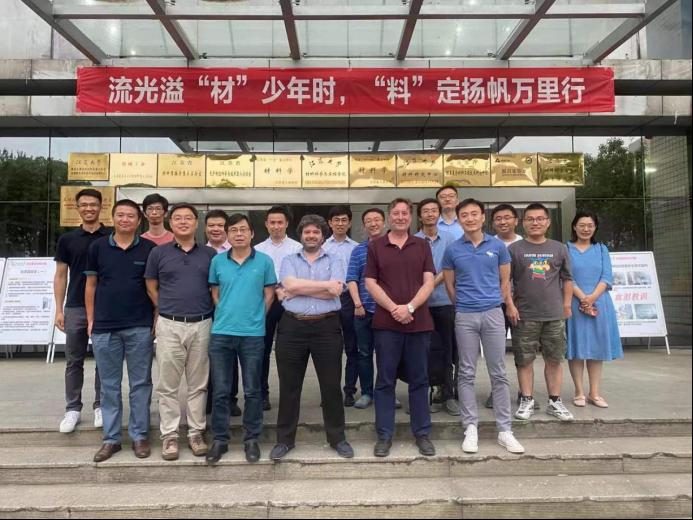On June 25th, 2021, a joint academic workshop was held together by Institute for Advanced Materials and Institute of Quantum and Sustainable Technology at 304 Lecture Hall in School of Materials Science & Engineering. Academician Federico Rosei was invited to give the keynote lecture and Prof. Mark H. Rümmeli from Soochow University was invited to give a special lecture. Young faculties from School of Materials Science & Engineering, Institute for Advanced Materials, Institute of Quantum and Sustainable Technology and Institute for Energy Research also introduced their works focused on the “bio/energy materials”.

Academician Rosei give a lecture named “The SDGs, Challenges and Opportunities for Researchers”, in which he presented a detailed introduction about the history of the world energy development and the trend of new energy in the future. Prof. Rümmeli from Soochow University expressed his excellent work about the application of electron microscopes in atomic precise synthesis and engineering. In addition, participants launched an in-depth discussion about the hot spots in recent research such as bio-sensors, fuel cells, solar cells, electrochemical catalysis, energy storage and so on.
This workshop effectively strengthens the international cooperation between foreign scientific institutions and Jiangsu University. It also deepens the academic communication of our institute with other departments in Jiangsu University, such as School of Chemistry & Chemical Engineering, Institute of Quantum and Sustainable Technology, Institute for Energy Research and so on. This workshop laid the foundation for future interdisciplinary, as well as multi-faculty and international cooperation.
Prof. Federico Rosei:
Prof. Federico Rosei is Fellow of the Royal Society of Canada, the Canadian academy of Engineering, and the European Academy of Science. He is also the professor and director of Institut National de la Recherche Scientifique, Énergie, Matériaux et Télécommunications, Canada, and Chairman of the UNESCO Energy Conversion and Storage Materials and Technology Direction.
Prof. Rosei’s research interests focus on functional nanomaterials and their systematic control and application, especially the construction of new energy materials based on micro- and nano- structures at molecular and atomic level. He has published over 200 articles in prestigious international journals (including Science, Nature and its series, Proceedings of the National Academy of Sciences, Advanced Materials, Angewandte Chemie Int. Ed., Journal of the American Chemical Society, etc.). Prof, Rosei serves in nearly 20 international academic organizations and has served as the chairman or organizer for international conference over 50 times. He won numerous internationally honors including Rutherford Memorial Medal in Chemistry and Friedrich Wilhelm Bessel prize. In 2014, he was awarded the José Vasconcelos World Award of Education for his outstanding contribution in education.
Prof. Mark H. Rümmeli
Prof. Mark H. Rümmeli got his PhD at London Metropolitan University in 1997. He then worked as a researcher in the German Space Agency (DLR) and joined Stratospheric Observatory for Infrared Astronomy (SOFIA) Project implemented by DLR and NASA. Since 2002, he has served as a professor at the Leibniz Institute for Solid State and Materials (IFW-Dresden) in Germany, acting as the leader of Molecular Nanostructures Group. Prof. Mark H. Rümmeli worked at Sungkyunkwan University in South Korea and established the Structural Analysis Group in the Korean Institute of Basic Science during 2013 to 2015. He is also a professor at Polish Academy of Sciences and Wuhan University in China. Since 2015, he has worked as a professor at the College of Physics, Optoelectronics and Energy, at Soochow University in China and his research interests focus on the application of electron microscopes in nanomaterials and nanostructures. To date, He has published over 260 articles in prestigious international journals such as Science, Nature Nanotech, Nature Comm, ACS Nano, Nano Lett, Adv. Mater, and so on.

